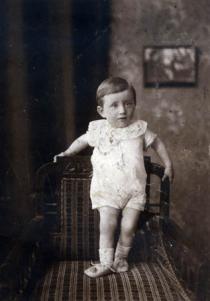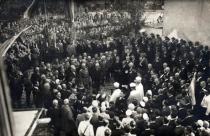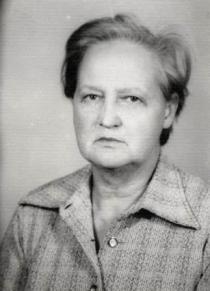The Natan family and their relative, Avram Pinkas
Standing from left to right are: my brother Avram Natan, my cousin Avram Pinkas (son of Rashel Pinkas who was sister of my mother) and I together with my parents Merkado Mois Natan and Rebeka Avram Natan (nee Geron) before my departure for Prague. The picture was taken in Ruse in 1949.
I got out of the prison in Pleven on 8th September 1944. We broke the jail, the police started fire on us, but we, the prisoners, slashed the cordon. There was a victim or two. After that we ran to the vineyard where we spent the night. In the morning everything was calm and we went back to Ruse. After that I worked for a year in the police. I was an intelligence officer at the State Security Service for a year. But after that I followed my father's advice - to complete my high-school education and to go to university. So I graduated from the high school and enrolled in the Ruse's Technical University. Later I applied for studying in the USSR. But then they played a trick on me - they hid my documentation. A member of the youth communist organization hid them, although he was in charge of submitting them. The reason was a simple envy - after which he confessed the fact to senior executives, but all the same - the deadline had passed. After that they sent me to Czechoslovakia as compensation, where I studied mechanical engineering. I learnt Czech language. My brother, after they closed the Ruse's Technical University, moved to Sofia, where he graduated from the Mechanical Electro-Technical Institute. My father worked in Ruse as a chairman of 'Clothes and Shoes' until he retired.
I studied in Prague from 1949 to 1952. There I lived in the Jewish hostel in 25 Belgicka Street. There were two Jewish hostels in Prague, indeed - one for boys and one for girls. They were maintained by Joint and were built especially for families that suffered from the Holocaust. Even the staff in these hostels was of Jewish origin. There was a great concern for the students in these hostels - they feeded and dressed us for almost nothing. I studied in the Czech Higher Technical School and I was impressed by the level of culture of the Czech people at that time. I was pleased with the education.
I came back and I was given a job in the Metal Cutting Machines Plant in Sofia. I wanted to work in Ruse, but I was told that there were too many engineers there and I got a refusal. They offered me to go to Haskovo, or to Vidin, but I told them that if I was to move to another town, that should be Sofia. So I got a job in Sofia. I was vice-technologist at the Metal Cutting Machines Plant in Sofia. I was not given an apartment, I was accommodated in a rented flat. Later we had a dispute with the director of the plant and in 1955 I resigned and found a job with the Institute for Rationalizations. I was an engineer in chief there and in 1956 I became a lector in Resistance of the Materials - Mechanics at the Military Academy. I was a civilian - that was my wish. My parents and brother moved to Sofia in 1956. We changed our rented flat in Ruse for one of a military man in Sofia who was to move to Ruse.
My mother died in 1958. She was buried in the Jewish cemetery in Sofia, but she didn't have a Jewish funeral because her husband arranged the funeral for a Saturday, when no Jewish funerals are carried out. He didn't want to wait because of the heat. So we remained my father, my brother and I. I met my wife Yanka, a Bulgarian, in 1957 at the Institute for Rationalizations. She was a librarian after which she became a telephone operator there. We got married in 1959.





























